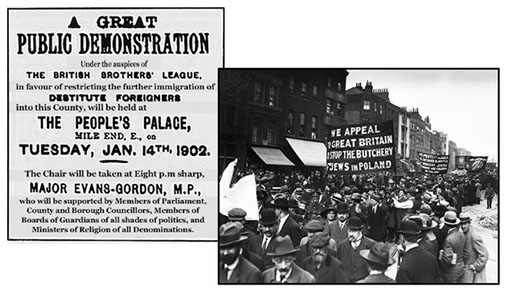1 A brief history of immigration law

As Figure 2 shows, immigration restrictions in the UK are not new. The Aliens Act 1905 (AA 1905), which aimed to restrict the entry of Jewish refugees fleeing persecution from Eastern Europe, was the first UK Act relating to immigration in the twentieth century. Controls took place against a backdrop of widespread anti-Semitism in the UK and agitation for control over immigration by the labour movement and others. Although foreign migrants were referred to as ‘aliens’ in the legislation, rather than ‘Jews’, anti-Semitic prejudice was widespread in the debates of the time.
You might see echoes of these themes in the present day discussion of legislation to restrict migrants, asylum seekers and refugees from settling in the UK. Subsequent legislation such as the Commonwealth Immigrants Act 1962 and the immigration acts which followed are characterised by ever-increasing immigration controls against black and ethnic-minority communities, and subsequently other migrants such as those from Eastern Europe.
Although eligibility of public services to those without the right permission to be in the UK had been government policy prior to 2010, in 2012, Theresa May, the then Home Secretary, declared her intention ‘to create here in Britain a really hostile environment for illegal migration’ (Kirkup and Winnett, 2012). This was followed by rules and legislation to put this intention into practice, for example the Immigration Acts 2014 and 2016. In setting out to create an environment hostile to people with insecure immigration status, a danger has been that the environment has become hostile to all migrants, regardless of whether or not they are lawfully resident in the UK – including, for example, the recent scandal relating to the Windrush generation.
Despite these restrictions, there are many examples where social workers can, and do, support people with insecure immigration status in both the statutory and voluntary sectors. For example, acting as a point of contact, helping people to gather evidence and write evaluations, and helping people access permitted forms of support, including unrestricted benefits (like school meals and clothing grants) and support from third-sector organisations, like food banks, and crisis grants.
Optional reading
One positive example of how social workers and students apply the law to support asylum seekers and refugees is featured in this article from Community Care: The social workers defending the rights of refugees [Tip: hold Ctrl and click a link to open it in a new tab. (Hide tip)] (McNicoll, 2015).
In this course you will hear from practitioners working in this field and look at different ways in which social workers can best apply the law to support migrants, asylum seekers and refugees.
